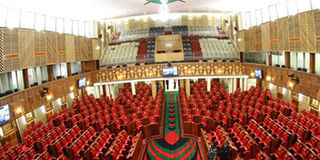Let’s do away with the National Assembly

The recently refurbished parliament chambers. Between the National Assembly and the Senate, the former appears to bear little significance in the devolved system of governance. PHOTO/FILE
What you need to know:
- Instead, there is a very weak link between the county governments and Parliament. The natural evolution emerging from our devolution process shows a strong link between county governments, the Senate and the National Executive. Parliament is, on the other hand, evolving as a kind of hip offshoot that is irritatingly present.
- In addition to the governor, a senator, promotes but also protects the interests of respective counties at the national level. Broadly, it can be argued, the senate best understands the agenda of the country.
Between the National Assembly and the Senate, the former appears to bear little significance in the devolved system of governance.
Of course, in terms of the way the Constitution is constructed, Parliament has powers originating from its functions that tend to place it above the Senate. Discussing national security, for instance, is thus a a job for the National Assembly.
Further, the institution has a wider leeway to discuss and legislate on a number of Bills compared to the narrow path the Senate has to fit itself into.
Notwithstanding the bad light that the current parliamentarians have earned for themselves, and in spite of some extremely brilliant MPs putting in performances, Parliament, as crafted in the Constitution, is not very beneficial to Kenyans.
The devolution we are implementing does not have Parliament as one of its inherent attributes. Indeed, Parliament was intended to be one of the central pillars of sustaining the devolved system, but upon hatching, there is no feasible way the system will perfect itself with the institution as part of its essence.
Instead, there is a very weak link between the county governments and Parliament. The natural evolution emerging from our devolution process shows a strong link between county governments, the Senate and the National Executive. Parliament is, on the other hand, evolving as a kind of hip offshoot that is irritatingly present.
Second, there is a multiplicity of representation roles. Members of County Assemblies are not even the smallest unit of elected leadership since clan elders are elected and have considerable influence at their level.
Further, a governor rules but also represents the county at the national level, even though this is not formalised within specific structures of national governance. The governor traverses constituencies in order to, hopefully, promote development. In this sense, governors are closely in touch with county residents.
CONCRETE ISSUES
In addition to the governor, a senator, promotes but also protects the interests of respective counties at the national level. Broadly, it can be argued, the senate best understands the agenda of the country.
In the Senate, concrete issues affecting county residents across the country are debated and given prominence. This a noble task in national development.
Third, county governments are actually best placed to identify, discuss, legislate and implement development in order of priority across the county.
Funds from the National Government, such as CDF and all those due to county governments are best put to use through a prioritising local institution, which in this case, is the county government.
The fact that these governments have legal mandate to pass Bills and ensure their implementation is a factor that needs positive interpretation.
It is, therefore, difficult to see the value of an MP whose constituents are well represented at county and national levels.
Fourthly, most of the duties that have been assigned to Parliament can be devolved. Bills of national importance should be discussed at the county level, then proposed to the caucus of governors, who can sieve and pass them to the Senate for final consideration.
What this process amounts to is a stronger actualisation of public participation in national discourse Besides cutting down on the huge public wage Bill, doing away with the National Assembly will strengthen the 47 county governments.
Thus, Kenya’s devolved system of governance has rendered the National Assembly unnecessary and county governments relevant. The Executive should learn to work with governors who are much closer to the people.
In conclusion, the continued existence of this House is likely to recreate presidentialism, a system that enabled county governments will naturally erase.





